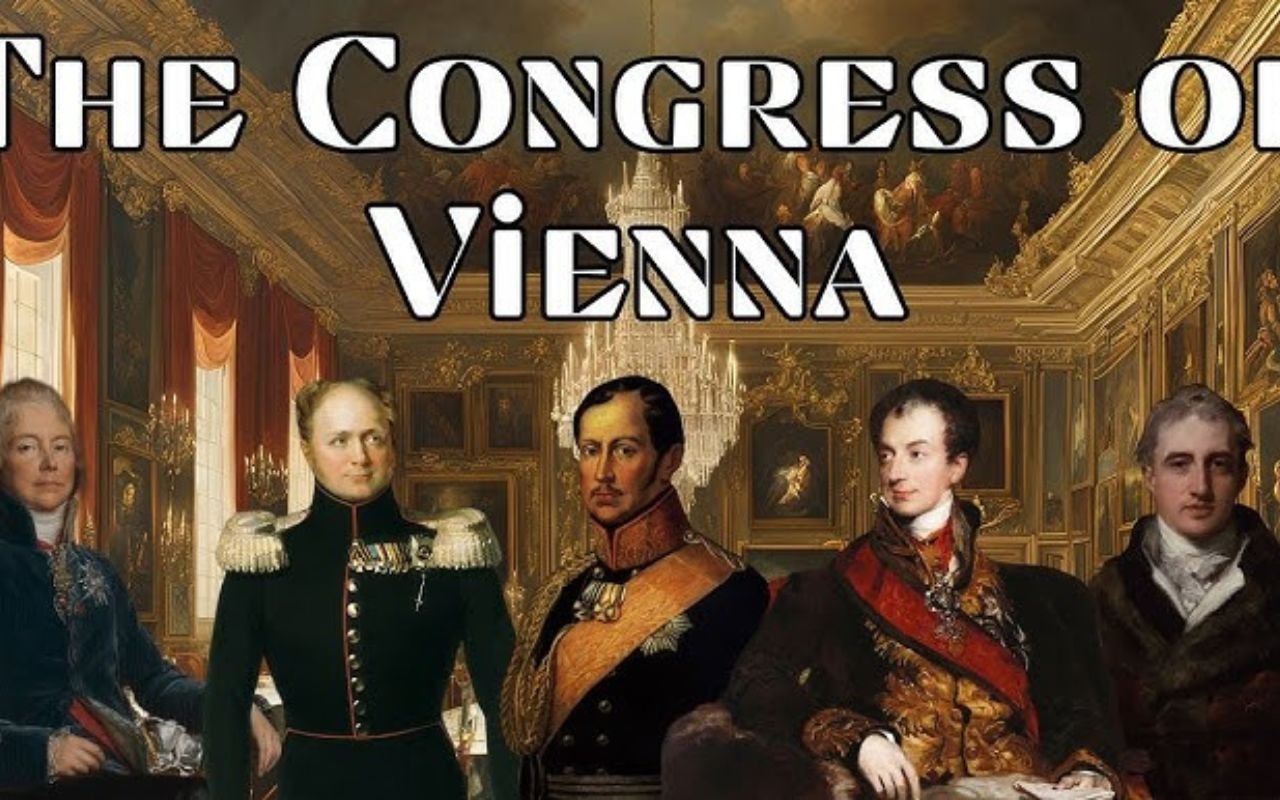The Congress of Vienna, held between 1814 and 1815, was a pivotal event in European history. It aimed to reshape the political landscape of Europe after the Napoleonic Wars, restore balance to the continent, and secure a lasting peace. The decisions made at this conference had far-reaching implications that not only impacted Europe’s political structure but also played a role in facilitating the growth of industrialization. While the Congress of Vienna is often remembered for its role in restoring monarchies and curbing revolutionary movements, it also contributed to the broader economic changes that would fuel the Industrial Revolution.
In understanding how the Congress of Vienna facilitated industrialization, it’s essential to examine its political decisions, the broader economic climate of Europe at the time, and how the aftermath of the Congress set the stage for industrial growth. The political stability and trade agreements established by the Congress laid the groundwork for economic expansion, while the influence of the French conservatives and their desire to maintain a status quo helped maintain order in a rapidly changing world. This article explores the relationship between the Congress of Vienna and industrialization, shedding light on how the conference indirectly contributed to the transformation of Europe into an industrial powerhouse.
The Political Aftermath of the Congress of Vienna and its Economic Impact
The Congress of Vienna focused on the restoration of order and stability in Europe after the turbulent Napoleonic Wars. The key players at the Congress included representatives from major European powers such as Austria, Prussia, Russia, and Great Britain, who sought to ensure that no single nation would dominate Europe as France had done under Napoleon. The outcomes of these negotiations were crucial for creating a framework that allowed for the economic conditions that supported industrialization to flourish.
One of the most significant outcomes was the establishment of a balance of power in Europe. The territorial realignments and diplomatic agreements put in place by the Congress of Vienna ensured that no single country could achieve the same level of dominance that France had during Napoleon’s reign. This created a more stable political environment across Europe, which was essential for economic growth.
Moreover, the Congress of Vienna reinstated conservative monarchies, most notably in France, where the Bourbon monarchy was restored. These French conservatives were keen on maintaining the old order, which, while limiting political reforms, ensured that the power dynamics remained predictable. For emerging industries and businesses, this stability was crucial as it provided a secure environment for economic activities to take place.
The Congress of Vienna and the Rise of Free Trade
One of the indirect ways that the Congress of Vienna facilitated industrialization was by setting the stage for an expansion of free trade. The agreements made during the Congress created a new political and economic order that allowed nations to pursue economic policies that were more conducive to industrial growth. The relative peace established by the Congress allowed European nations to focus on economic development rather than military conflict, and the opening up of markets through trade was essential for the spread of industrialization.
The end of the Napoleonic Wars marked a turning point in European trade. The Congress of Vienna helped foster a period of relative peace, reducing the number of trade barriers that had been erected during the wars. As countries like Britain, which had already begun industrializing, expanded their manufacturing sectors, they sought new markets for their goods. The newly established stability encouraged investment in infrastructure, such as railways and canals, which were vital for transporting goods across Europe.
In addition, the Congress of Vienna established a system of alliances and trade agreements that helped integrate European economies. The creation of a more interconnected European economy created the conditions for the expansion of industrial ventures, particularly in Great Britain, where the industrial revolution had already begun in earnest. As these economies became more integrated, the exchange of goods, technologies, and ideas became more fluid, accelerating industrial growth.
The French Conservatives and their Influence on Economic Stability
While the Congress of Vienna sought to restore order through political stability, it also indirectly supported the development of industrialization by curbing the rise of radical movements. The French conservatives who gained power after Napoleon’s defeat were committed to preserving the traditional political order, which included the protection of private property rights. The preservation of these rights was a crucial factor in fostering an environment that was conducive to business and industrial growth.
The French conservatives, as well as other monarchies that were reinstated following the Congress of Vienna, played a crucial role in supporting the idea of private enterprise. The political stability they ensured allowed for the accumulation of capital and the expansion of banking systems, both of which were vital for the industrialization of Europe. Conservative governments were also less likely to interfere with the rise of industrial capitalism, allowing entrepreneurs and inventors to flourish in an environment that valued economic success.
Moreover, the conservative political atmosphere also helped prevent the rise of political upheaval and revolution in the years following the Congress of Vienna. While industrialization often brings with it social changes and tensions, the French conservatives, in particular, sought to limit these tensions by ensuring that the new industrial classes did not disrupt the traditional power structures.
Infrastructure and the Expansion of Railways
The Congress of Vienna’s political stability indirectly fostered the growth of infrastructure necessary for industrialization. With peace established across Europe, many countries began to invest heavily in the development of infrastructure such as roads, canals, and railways. This infrastructure was essential for the movement of raw materials and finished products, facilitating industrial growth.
In particular, the development of railways played a pivotal role in the growth of industrialization. The railway system allowed for the rapid transport of goods, which was essential for expanding industrial production. Railways connected major industrial centers, enabling businesses to access new markets and raw materials more efficiently. The Congress of Vienna’s creation of a stable political climate allowed for these infrastructure projects to take place with greater ease and security.
The Growth of Banking and Investment
Another key element of industrialization that was facilitated by the Congress of Vienna was the growth of banking and investment. The political stability that followed the Congress of Vienna provided a secure environment for the development of financial institutions. As European economies began to expand and industrialize, there was a growing need for capital to finance the construction of factories, infrastructure, and new technologies.
Banks and financial institutions flourished in the post-Congress of Vienna period, providing the necessary capital for entrepreneurs to fund new ventures. Additionally, the relatively peaceful political climate allowed for the safe accumulation and investment of wealth, which in turn fueled the growth of industrial ventures. This growth of financial markets was critical in enabling the spread of industrialization across Europe.
Conclusion: The Congress of Vienna’s Long-Term Impact on Industrialization
The Congress of Vienna was primarily concerned with establishing a new political order in Europe, but its effects extended far beyond politics. The peace and stability established by the Congress laid the groundwork for economic growth and industrialization. The integration of European markets, the expansion of infrastructure, and the growth of banking and investment all contributed to the rise of industrialization in the 19th century. The political stability that the Congress of Vienna brought, coupled with the conservative efforts to protect private enterprise, provided a favorable environment for the emergence of new industries.
While the Congress of Vienna may not have been directly responsible for the technological advancements of the Industrial Revolution, its impact on the political and economic landscape of Europe helped create the conditions necessary for industrialization to thrive. The Congress of Vienna helped pave the way for a new era in European history, one that would see the transformation of economies and societies across the continent.
FAQs
What was the main goal of the Congress of Vienna?
- The main goal was to restore order and stability in Europe after the Napoleonic Wars and prevent further revolutions.
How did the Congress of Vienna impact European trade?
- It created a period of relative peace, allowing for the reduction of trade barriers and the expansion of free trade.
Did the French conservatives support industrialization?
- Yes, French conservatives maintained political stability, which indirectly supported industrial growth by protecting private property rights.
How did the Congress of Vienna affect banking and investment?
- The political stability following the Congress allowed for the growth of banking and investment, essential for financing industrial ventures.
How did railways contribute to industrialization?
- Railways facilitated the efficient transport of raw materials and finished products, which was crucial for industrial growth.





